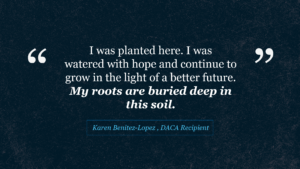This summer, the Supreme Court’s ruling that the Trump administration moved unlawfully to wind down Deferred Action for Childhood Arrivals (DACA) offered recipients a temporary sigh of relief. After years of uncertainty, we finally had a moment to rejoice. Many supporters begin to cheer.
But the excitement was short-lived: The court ruled on a technicality, so Dreamers remain stuck in constant limbo between home in America and the threat of being returned to unfamiliar lands.
That’s why Congress must move quickly to pass a permanent solution that protects Dreamers from deportation.
According to the National Immigration Law Center, more than a third of DACA recipients arrived in America before age five. The average Dreamer was brought here at roughly age seven and has lived in the USA for 20 years — this is the place we know as home.
I was two years old when I first set foot on American soil. My earliest memory is of my first winter in South Dakota. It was my third birthday, and I was dancing in a beautiful dress sewn by my abuelita as the streets were covered in snow.
As the years passed, I created newer memories, growing up in South Dakota with my closest friends — just a couple of kids from the Midwest. We grew up the same, we just came from a different seed. Like an exotic plant relocated from a foreign country, I was planted here. I was watered with hope and continue to grow in the light of a better future. My roots are buried deep in this soil.

Dreamers like me are American in every way but paperwork.
In 2012, with the announcement of DACA, young immigrants thought their lives had changed forever. There was talk of hope, a better way of life. A chance to be able to work and go to school just like our friends, a chance to walk the halls without fear. A chance to be normal.
When work permits finally arrived in the mail, a weight was lifted off many people’s shoulders. I had started to learn about work ethic and mastering skills when I was younger. When I got my DACA work permit at 15, I went out and got a job immediately.
DACA allowed me to apply my knowledge to several jobs. By 18, I had two full-time jobs and graduated from high school. And today, thanks to DACA, I’m pursuing my passion of teaching early childhood education. I’m now teaching preschoolers Spanish.
Unfortunately, the cloud of uncertainty lingers. We continue to fight to prove that we are doing right by this country — our home — yet we miss out on growth opportunities, with the required renewal of our protections every two years leaving us feeling like our time here is fleeting. DACA recipients should not be thought of as potentially risky to a bank offering a student loan or mortgage. Meanwhile, we pray we can maintain our protected status in order to continue our lives with the people and communities we love.
Over the next 10 years, DACA recipients will contribute an estimated $433.4 billion to the GDP and $12.3 billion in taxes to Social Security and Medicare. There is no doubt that DACA recipients are imperative to the U.S. economy.
What’s more, an overwhelming majority of Americans favor a solution for Dreamers. They continue to advocate for a bipartisan solution that will allow us to continue to contribute to the economy and our communities and eventually earn our citizenship.
For now, DACA is just a Band-Aid for young immigrants like me who were brought to the U.S. as children. It’s time we find a permanent solution.
I was born a Dreamer and raised a fighter. I will continue to fight to stay, for my roots are buried here. This is home.
Karen Benitez-Lopez is the Lead Teacher at the EmBe Spanish Immersion Preschool. She was born in Queretaro, Mexico, and raised in Sioux Falls.

